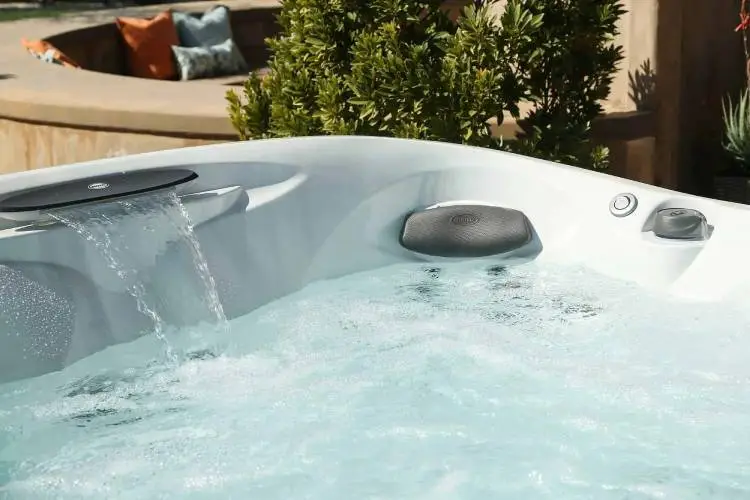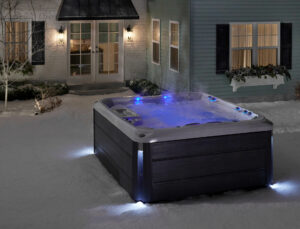Have you ever taken a hot bath or shower after a tough game?
You probably felt your muscles relax and the tension in your shoulders fade away.
This is hydrotherapy at work, and it’s proven to help athletes of all kinds recover from injuries or pain.
Sometimes working out feels like a battle against your own body. Your muscles are sore from micro-tears, and your ligaments are stretched to their limit.
But hot tubs can help ease these pains, giving you a chance to heal before you head back into action.
From the public baths of the Indus Valley (2500 BC) to the natural hot springs of Ancient Japan, hot water has improved health and wellness worldwide for thousands of years.
Now, athletes use hydrotherapy to promote recovery from strenuous exercise.
In this article, we’ll look at hot tub hydrotherapy, the science behind it, and how it can benefit athletes.
How Hot Tub Hydrotherapy Works
The term hydrotherapy refers to a variety of therapeutic methods that use water as an agent in treating various health conditions, including:
- Physical therapy to treat muscle spasms, arthritis, sports injuries, etc.
- Massage therapy – uses warm or cool water to relax muscles and relieve stress
- Aquatic exercise – combines swimming, walking, running, balancing, etc.
Hot tub hydrotherapy focuses mainly on massage therapy. Hot tub temperatures increase the circulation of oxygenated blood throughout the body. The temperature of a hot tub is key to its effectiveness.
Hydrotherapy works best in hot tubs that are at least 100 degrees Fahrenheit (37 degrees Celsius).
The heat shouldn’t exceed 104 degrees Fahrenheit (40 degrees Celsius).
Hot tub hydrotherapy offers relief that other methods may not provide. The pressure from hydromassage jets gets the blood moving around the body, soothing muscles, tendons, and other soft body tissues. This is especially important for athletes who spend most of their time working out and less time relaxing.
Jacuzzi® Hot Tub jets are especially popular among football, rugby, and soccer players, as they provide relief for achy legs and calves.
Massage jets are more effective than simply immersing yourself in hot water. Look for a hot tub that hits the proper spots for total body relaxation.
Hydropool Swim Spas can accommodate year-round aquatic exercise.
They look like hot tubs, but they’re outfitted with water jets and other features to allow you to go against the current. Resistance helps strengthen your muscles while also providing an excellent cardio workout.
Pump Up Your Performance With Hydrotherapy
Hydrotherapy is a hot topic in the sports world.
Many athletic organizations have hot tubs in their locker rooms. Professional sports teams recognize that hot water therapy helps to improve athletes’ performance.
A hot tub makes a great addition for any athletic club looking to make its members healthier and happier.
Hot tub hydrotherapy can assist athletes both before and after a game or event.
How Hydrotherapy Can Benefit Athletes BEFORE The Game
Reduce Stiffness and the Likelihood of Injury
Stretching muscles while immersed helps to increase flexibility by improving the range of motion in joints.
The buoyancy of the water in a hot tub provides a soothing, gentle pressure. Improving athletic mobility aids in effective warm-ups and minimizes the likelihood of muscle strains.
Decrease Stress
A hot tub helps athletes reduce stress related to training or competition.
Hot water has a calming effect that decreases blood pressure and releases endorphins – our body’s natural painkillers.
Endorphins reduce the physical and psychological impact of pain and fatigue.
A hot tub regimen relaxes the mind and the body, allowing athletes to perform at their peak.
How Hydrotherapy Can Benefit Athletes AFTER The Game
Speed up Recovery
Hot tubs are great for athletes recovering from sprains or injuries.
They enable your body to recover faster between sessions, allowing you to perform better at your next event.
Using a hot tub after a hard workout not only relaxes muscles but also lowers delayed-onset muscle soreness (DOMS).
According to Brett Fischer, owner/founder of the Fischer Institute in Phoenix, hot tubs work best for relieving muscle aches 12 to 24 hours after intensive activity.
Hot water is proven to help decrease lactic acid. A lactic acid build-up is the by-product of anaerobic exercise, which can lead to muscle fatigue.
Warm water immersion helps transport lactic acid away from the muscles and reduces tension.
Water buoyancy helps support muscles and joints to make recovery more comfortable, especially for chronic pain conditions like arthritis.
Improve Circulation
A hot tub regimen is sure to improve circulation and is an effective way to help reduce blood pressure and the risk of heart disease.
Hot tub temperatures cause your blood vessels to dilate.
The increase in blood flow means oxygen and nutrients can reach affected areas. Now you can train harder and longer with better results.
Please note that hot tubs shouldn’t be used by anyone with unstable chest pain or high blood pressure.
Decrease Muscle Soreness
Hydrotherapy is beneficial for athletes concerned with the long-term health of their joints, like swimmers or tennis players.
Regular exposure to heat, buoyancy, and massage can help with musculoskeletal issues.
Hot tub hydrotherapy is also popular amongst triathletes, who use hot tubs to recover from muscle cramps (waiting at least 24 hours before doing so).
If you experience regular muscle cramps, you should stay hydrated.
So, before using the hot tub, make sure to drink enough water.
Improve Sleep
If you have trouble sleeping, soak for 15-20 minutes before bed and let the hot water work its magic.
When your muscles are warm, blood flows more readily. As a result, you’ll feel more relaxed as your body temperature rises.
Athletes who can sleep uninterrupted for eight hours perform better than those struggling to get the right amount.
Hot Tub Usage
Keep track of how much time you spend in the hot tub. You cannot simply plunge in and out; instead, we recommend you stay submerged for at least 15 minutes to get the full benefit.
Hot tub sessions should take place 12 to 24 hours following a workout or a few hours before the activity to help warm up the muscles.
Before using hot tubs as part of any regimen, people should contact their doctor. This is particularly true for those with known heart issues, pregnant women, people taking blood thinners or similar medications, and those who’ve had recent surgery.
Hydrotherapy is not a replacement for proper medical treatment when injured.
There’s no denying the positive effects of hydrotherapy for athletes. Hot tubs offer an opportunity to relax and unwind without leaving the house.
You don’t need any special equipment or skills to enjoy this type of therapy.
If you’re looking for ways to promote better health and wellness, consider using hot tub hydrotherapy to achieve the following:
- Promote flexibility
- Reduce stress
- Relieve discomfort
- Improve sleep quality
The Perfect End to an Athlete’s Day
We hope you found this post helpful. Whether you’re looking for ways to improve your athletic performance or want to relax in the evenings with family and friends,
Spa Palace Hot Tubs are an excellent addition to any outdoor space.
You deserve a hot tub or swim spa that’s ideal for your needs and lifestyle.
That’s why our professionals are available to answer any inquiries or address any issues you may have regarding our products.
If you can’t find what you’re searching for on our website, get in touch. We’ll help you discover the perfect model!




